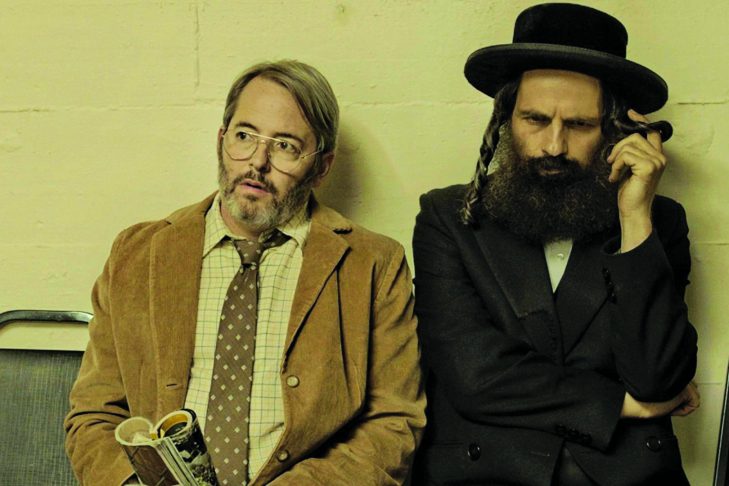Written and directed by Shawn Snyder, “To Dust” is the ultimate caper cum buddy film. The film features quirky performances by Géza Röhrig as Shmuel and Matthew Broderick as Albert. Röhrig did a star turn in the Oscar-winning foreign film “Son of Saul.” He is also an Orthodox Jew who, in real life, volunteers to prepare bodies for traditional Jewish burials. It seems fitting that he has a leading role in a surprisingly funny film about the gritty details of death.
Shmuel is a Hasidic Jew, cantor and recent widower. He loved his late wife, Rivka, dearly and is obsessed with guaranteeing that her soul is released from her body. Rather than simply saying the Mourner’s Kaddish to achieve this spiritual goal, Shmuel is intent on monitoring the actual decay of his wife’s body. He believes once her body is completely decomposed her soul will reach heaven.
The film was previewed last weekend at Coolidge Corner Theatre and will open there on Friday, March 8. On hand to screen the film was co-producer Alessandro Nivola. Nivola is married to the actor Emily Mortimer, another producer on the film. Mortimer discovered this story when she was a juror for scripts submitted to a screenwriting competition supported by the Alfred P. Sloan Foundation and the Tribeca Film Institute. “It was unlike anything that Emily or I had ever read before. It was telling a story in a new way, and it had an original way of approaching grief,” Nivola said.
It’s a wild premise for a buddy movie. Part of Shmuel’s grieving process includes him needing to know the exact moment his wife becomes bone and ash. He sets out to learn about body decomposition and barges into a local community college where he meets Albert, a biology instructor. It’s not clear whether Albert is Jewish, but it doesn’t matter. Everything about Shmuel is ultimately confusing. Albert tries to send Shmuel on his way, but he insists that Albert give him a biology lesson. The hapless teacher shows Shmuel pictures of a dead baby pig decomposing. The pig images are graphic—something I could have done without—as are Shmuel’s nightmares about his wife’s rotting toe.
Not satisfied with what he has observed in those pictures, Shmuel steals a full-grown pig from a farm and brings the animal to Albert’s apartment. Albert wants no part of the pig or Shmuel, but he somehow gets drawn into Shmuel’s very unorthodox science experiment. Albert ends up helping Shmuel bury the pig in the woods. Thus a full-blown scientific inquiry is launched.
Shmuel is a meticulous investigator. He insists on checking the pig’s rate of decomposition every month. This means that the two men dig up the pig, then bury it again, and then dig it up again. The dead pig is surely one of the strangest comedy props in recent film history.
There is also a sweet parallel story. Shmuel’s two young sons observe his weird behavior, which consists of nocturnal outings to their mother’s grave and to the woods that are only accessible by rowboat. The boys are convinced that a dybbuk—a demonic spirit—has taken over their father’s body. That spirit, they conclude, is the restless ghost of their departed mother.
Like any good buddy film, Shmuel and Albert eventually take a road trip. Theirs is to the Forensic Anthropology Center at the University of Tennessee in Knoxville, commonly known as the “Body Farm.” On the “farm,” students, researchers, law enforcement officials and medical examiners study decomposing bodies to determine how to recover human remains, estimate the time of death and piece together who the person was and how they died. Somehow this all seems logical for Shmuel and Albert to understand.
Nivola noted that while the scenes at the Body Farm were not shot on location, Mortimer was a stand-in for one of the bodies. “We threw sawdust and stuff on top of her and shot her body with a weird filter lens,” he said.
Nivola, who is no stranger to playing ultra-Orthodox Jews—he was a rabbi in 2017’s “Disobedience”—observed that “the pairing of Matthew and Geza was odd, but it worked. Science and religion were not presented in an adversarial manner. Even though Shmuel was going outside of his community for answers, these two men ended up having a beautiful friendship.”
In the process, Rivka’s soul almost certainly arrived in heaven at the end of her husband’s long, strange, albeit powerful, journey of grief.
Find more information on showings of “To Dust” here.



